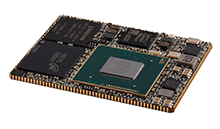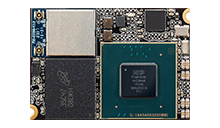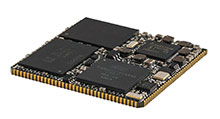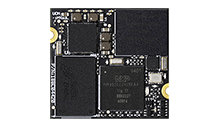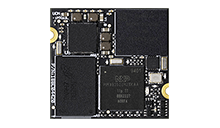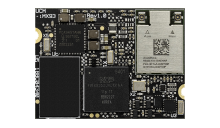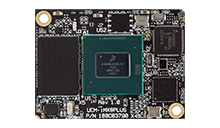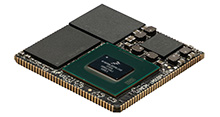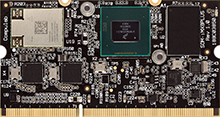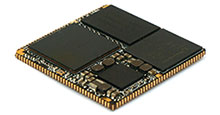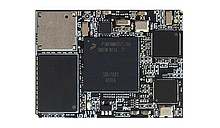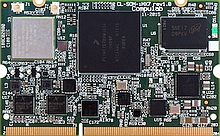System on Modules
- 15-Years Availability
- In-House Manufacturing
- Direct Engineer Support
- Linux and Yocto BSPs
- Pin2Pin compatible SOMs
- SMT-level Configure-to-Order
Choosing the right System on Module
There are many important factors to consider such as connectivity features, form-factor, software support, power consumption and longevity. Learn more in our comprehensive SOM Comparison Guide.
- NXP i.MX95 @2.0GHz
- Up to 16GB LPDDR5, 128GB eMMC
- ARM Mali GPU, 4K VPU and AI/ML NPU
- 2x LVDS, MIPI-DSI, 2x MIPI-CSI
- 2x RGMII + 10GbE, 2x PCIe, USB3.0
- 5x CAN, 8x UART, 8x SPI, 75x GPIO
- SMD solder-down form-factor
- 34 x 42 x 3 mm
- NXP i.MX95 @2.0GHz
- Up to 16GB LPDDR5, 128GB eMMC
- ARM Mali GPU, 4K VPU and AI/ML NPU
- 2x LVDS, MIPI-DSI, 2x MIPI-CSI
- GbE + 10GbE, 2x PCIe, USB3.0
- Certified 802.11ax WiFi and BT 5.3
- 5x CAN, 8x UART, 8x SPI, 75x GPIO
- 28 x 40 mm, UCM pin2pin family
- NXP i.MX93 @1.7GHz
- Up to 2GB LPDDR4, 64GB eMMC
- AI/ML Neural Processing Unit
- LVDS, MIPI-DSI and parallel RGB
- 2x RGMII, 2x USB, 8x UART
- 8x SPI, 2x CAN-FD, 80x GPIO
- SMD solder-down form-factor
- 30 x 30 x 3 mm
- NXP i.MX91 @1.4GHz
- Up to 2GB LPDDR4, 64GB eMMC
- GbE, 2x RGMII, 2x USB
- 7x UART, 2x CAN-FD, 2x SDIO
- 7x SPI, 6x I2C, 65x GPIO
- 28 x 30 x 4 mm, UCM pin2pin family
- NXP i.MX93 @1.7GHz
- Up to 2GB LPDDR4, 64GB eMMC
- AI/ML Neural Processing Unit
- LVDS, MIPI-DSI and MIPI-CSI
- GbE, RGMII, 2x USB
- 7x UART, 2x CAN-FD, 2x SDIO
- 7x SPI, 6x I2C, 65x GPIO
- 28 x 30 x 4 mm, UCM pin2pin family
- NXP i.MX93 @1.7GHz
- Up to 2GB LPDDR4, 64GB eMMC
- AI/ML Neural Processing Unit
- LVDS, MIPI-DSI and MIPI-CSI
- GbE, 2x RGMII, 2x USB
- 7x UART, 2x CAN-FD, 79x GPIO
- Certified 802.11ac WiFi, BT 5.3
- 28 x 38 mm, UCM pin2pin family
- NXP i.MX8M Plus @1.8GHz
- Up to 8GB LPDDR4, 64GB eMMC
- AI/ML Neural Processing Unit
- 1080p VPU and GPU
- HDMI, LVDS, MIPI-DSI, 2x MIPI-CSI
- PCIe, GbE, 2x USB3.0
- 2x CAN, 4x UART, 75x GPIO
- 28 x 38 mm, UCM pin2pin family
- NXP i.MX8M Plus @1.8GHz
- Up to 8GB LPDDR4, 64GB eMMC
- AI/ML NPU, 1080p VPU and GPU
- HDMI, LVDS, MIPI-DSI, 2x MIPI-CSI
- PCIe, 2x RGMII, 2x USB3.0
- 2x CAN, 4x UART, 115x GPIO
- SMD solder-down form-factor
- 30 x 30 x 3 mm
- NXP i.MX8M Plus @1.8GHz
- Up to 8GB LPDDR4, 128GB eMMC
- AI/ML NPU, 1080p GPU and VPU
- HDMI, LVDS, MIPI-DSI, 2x MIPI-CSI
- 2x GbE / RGMII, PCIe, 2x USB3.0
- 2x CAN, 4x UART, 88x GPIO
- Certified 802.11ac WiFi, BT 5.0
- 36 x 68 x 5 mm
- NXP i.MX8M Mini @1.8GHz
- Up to 4GB LPDDR4, 64GB eMMC
- 1080p VPU and GPU
- MIPI-DSI and MIPI-CSI
- PCIe, RGMII, 2x USB
- 4x UART, 2x SDIO, 86x GPIO
- SMD solder-down form-factor
- 30 x 30 x 3 mm
- NXP i.MX8M Mini @1.8GHz
- Up to 4GB LPDDR4, 64GB eMMC
- 1080p VPU and GPU
- MIPI-DSI and MIPI-CSI
- PCIe, GbE, 2x USB
- 4x UART, SDIO, 85x GPIO
- WiFi 802.11ac and BT 4.2
- 28 x 38 mm, UCM pin2pin family
- NXP i.MX7 @1GHz
- Real-time Cortex-M4 MCU
- Up to 2GB DDR3, 32GB eMMC
- LVDS, MIPI-DSI, parallel RGB
- PCIe, 2x GbE, 5x USB, 2x SDIO
- 7x UART, 2x CAN, 124x GPIO
- WiFi 802.11a/b/g/n and BT 4.1
- 42 x 68 x 5 mm
Benefits of using System-on-Module
System on Modules help product developers to accelerate time to market, optimize development cycle and reduce cost of ownership. Compulab SOM products are used by thousands of customers worldwide in medical devices, transportation, industrial automation, telecommunication, aerospace systems and countless other applications.
Accelerate time to market
Minimize risk and reduce development time by using a System on Module as a proven and validated off-the-shelf solution.
Optimize development costs
Avoid the costs associated with designing and manufacturing complex computer hardware and leverage economy of scale.
Offload complexity
Allow your developers to focus on your core application hardware and software and unique product features.
Ensure long-term availability
Benefit from reliable supply and support throughout the lifecycle of your product with guaranteed 15-years SOM availability.
System-on-Module applications in industry
SOMs are a perfect fit for many different environments. In the medical field, SOMs power sophisticated diagnostic equipment and portable medical devices, enabling faster and more accurate healthcare solutions. Building automation systems leverage SOMs to control lighting, HVAC and security, enhancing energy efficiency and occupant comfort.
Precision measurement and laboratory devices rely on SOMs for their computational power and data acquisition capabilities, ensuring accurate and reliable results. System on Modules are also being used in industrial control systems, where plants utilize SOMs to monitor and control complex processes, increasing efficiency and productivity.
For additional information refer to System on Module Applications page.
